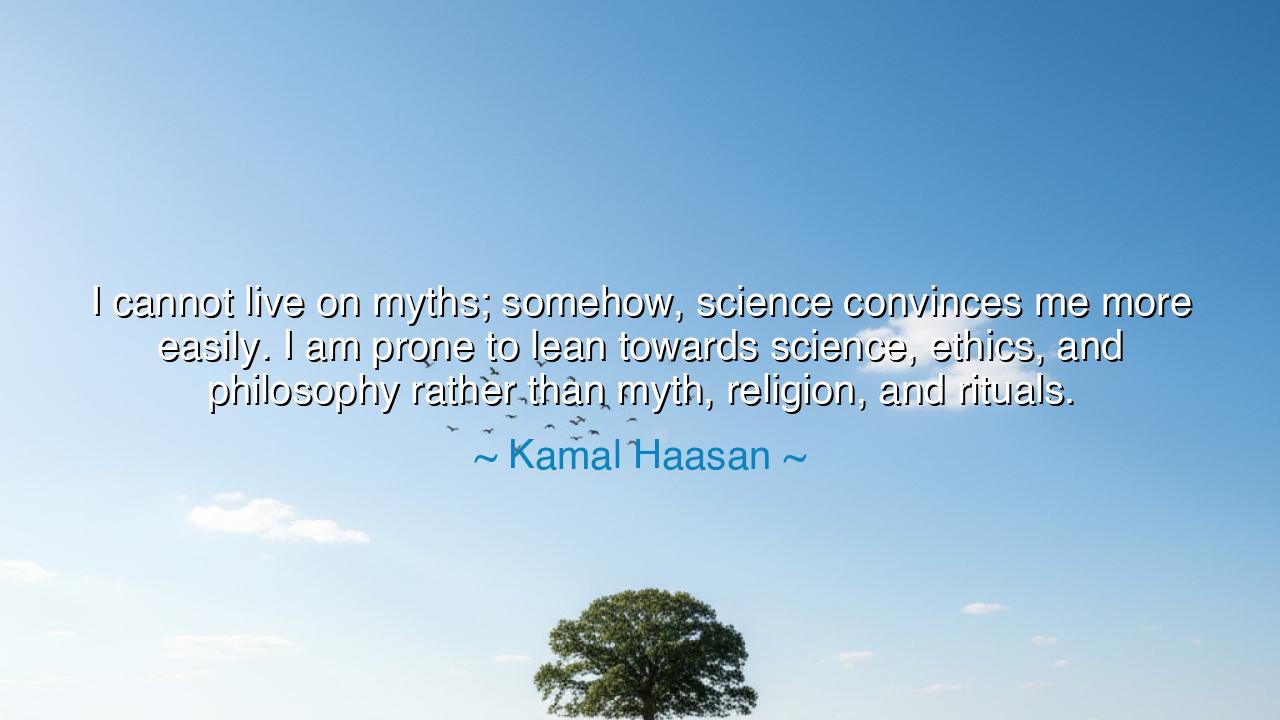
I cannot live on myths; somehow, science convinces me more
I cannot live on myths; somehow, science convinces me more easily. I am prone to lean towards science, ethics, and philosophy rather than myth, religion, and rituals.






The words of Kamal Haasan — "I cannot live on myths; somehow, science convinces me more easily. I am prone to lean towards science, ethics, and philosophy rather than myth, religion, and rituals." — stand as a declaration of the modern spirit seeking clarity in a world clouded by tradition. In these words, Haasan speaks of the eternal tension between myth and science, between the symbolic stories of the ancients and the rational inquiries of the present. He does not dismiss the beauty of myth, but he refuses to build his life upon it. Instead, he places his trust in science, in ethics, and in philosophy — disciplines that search for truth through reason, evidence, and the moral compass of humanity.
The origin of this thought lies in the journey of a man who has lived both as an artist and a thinker. Haasan, through cinema and reflection, has witnessed how rituals and religion can at times bind people more than they liberate them. Myths, while rich in poetry, cannot always answer the pressing questions of existence: how disease spreads, how societies must govern, how justice must be pursued. For these, he finds his anchor not in inherited tales, but in the method of science and the wisdom of philosophy. His words remind us that to live honestly in the modern age requires courage to question the old and embrace the tested.
History shows us how this struggle has unfolded again and again. Galileo Galilei, when he looked through his telescope and declared that the earth revolved around the sun, was condemned by those who clung to religious myth. Yet his loyalty to science over superstition gave birth to a new age of knowledge. Likewise, Socrates, by questioning the myths and rituals of Athens, turned the gaze of men inward, toward reason and ethics, laying the foundation of Western philosophy. These figures embody the same spirit Haasan embraces: to choose inquiry over blind acceptance, to seek truth beyond the comfort of inherited stories.
Yet Haasan’s words also carry a warning. Myths and rituals, if mistaken for absolute truth, can divide people, imprison minds, and justify cruelty. But science, though powerful, is not enough on its own. It must be tempered with ethics and philosophy, lest it become a tool of destruction rather than healing. The splitting of the atom, after all, brought both the light of nuclear energy and the fire of Hiroshima. Thus, Haasan does not lean on science alone, but pairs it with the moral compass of philosophy and the guiding star of ethics, ensuring that knowledge serves humanity rather than destroys it.
The meaning is clear: life must be built upon what can endure scrutiny, what can be tested, what can improve the condition of mankind. Myths may inspire, but they cannot cure disease. Rituals may comfort, but they cannot abolish injustice. Only the combined force of science, ethics, and philosophy can guide humanity through the storms of the present into a more just and enlightened future. To lean toward these is not to reject beauty, but to choose clarity over illusion, and progress over stagnation.
The lesson for us is profound: do not live by myth alone, nor by science alone. Question the stories you inherit. Test them against reason, against compassion, against evidence. Do not abandon wonder, but ground it in truth. Let science be your lantern, ethics your staff, and philosophy your map. In this way, you will not be misled by the shadows of superstition, nor blinded by the light of unchecked power.
What, then, should you do in practice? Educate yourself in the methods of science, for they sharpen the mind. Reflect deeply on philosophy, for it strengthens the soul. Live by ethics, for they ennoble the heart. And when myths come to you, receive them not as literal truth, but as stories with symbolic value, to be honored for their poetry but not mistaken for reality.
Thus let this wisdom endure: do not live on myths when truth calls you higher. Let your path be lit by science, steadied by ethics, and guided by philosophy. For in this trinity lies a way of life both strong and humane, capable of lifting mankind beyond ritual into the clear light of understanding.






AAdministratorAdministrator
Welcome, honored guests. Please leave a comment, we will respond soon